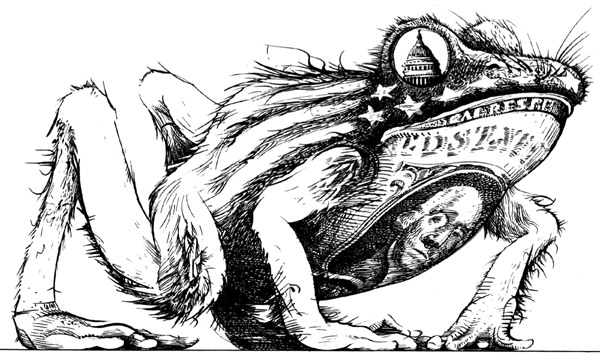
The first White House state dinner was given in 1874 by President Ulysses S. Grant for King Kalakaua, of Hawaii. According to Barry Landau’s book The President’s Table, there were only 36 guests but “as many as 29 courses,” all French. Rutherford B. Hayes’s 1877 state dinner for the czar of Russia’s son featured filets de boeuf à la Richelieu and punch au kirsch. Grover Cleveland gave a candlelit dinner for the King of Spain’s daughter in 1893. Theodore Roosevelt hosted a stag dinner for Prince Henry of Prussia, the brother of Kaiser Wilhelm II, in February 1902, a few months before work began on McKim, Mead and White’s restoration of the White House, which, among other things, enlarged the State Dining Room to accommodate up to 100. —“The White House’s Dinner Theater,” Bob Colacello, Vanity Fair
When the truth is a lie then God will have to set you free, or something like that–it’s Alabama, folks;
money is like Vietnam, filed under “things rather liberal folks like to say in print and at cocktail parties”;
Robin Hood: racist xenophobe?
The video games I love allow me to observe and control fictional characters, and when I am at the helm, I try to make these characters behave not as how I would but how I feel they want to—a strange sympathetic process for which there is, as of now, no good name. While I frequently wish video games were better written and more multifarious in their subject matter, this observation-while-in-partial-fictive-control is wholly unique to games. None of which, of course, automatically makes video games into art, much less those who play them into artists, but it does suggest that video games are bringing civilians within range of an interactively transformative experience previously available only to artists. —“Dismissives: Two Angry Letters Responses to ‘Cave Painting’ & ‘On Gordon Brown,” Tom Bissell, N+1
You too can be the next broke, corrupt, badly-managed, and disgraced second-world nation;
corpse-wood pizza in Naples (the new artisanal);
Vermont–hotbed of international terrorism (some jokes never stop being funny)
An iPhone, as coveted as it may be, is not a baby. I get it. But in terms of personal choice, consumption, and global interdependence, the two are on a relevant continuum. Americans, most of them anyway, live in a time of relative abundance, even in this economic recession. We are faced with daily choices that impact the rest of the world in very concrete ways, and this new reality requires what Daniel Goleman calls “ecological intelligence” — the capacity to analyze what we consume so as to make the most sustainable decision. –“The Population Debate Gets Personal,” Courtney E. Martin, American Prospect
The eternal question–What is a philosopher? The daily newspaper answer: “a laughing stock, an absent-minded buffoon, the butt of countless jokes from Aristophanes”;
dark winter of the German econo-soul;
ride on, metal god


